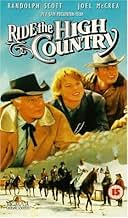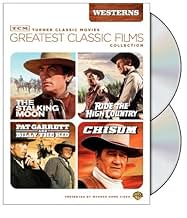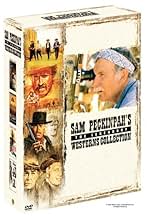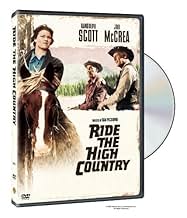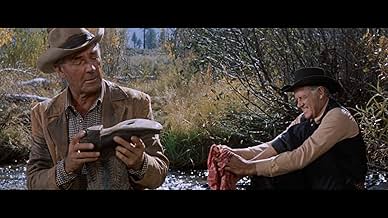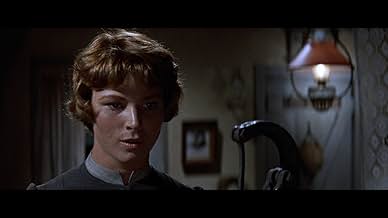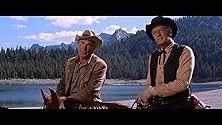An ex-union soldier is hired to transport gold from a mining community through dangerous territory. But what he doesn't realize is that his partner and old friend is plotting to double-cross... Read allAn ex-union soldier is hired to transport gold from a mining community through dangerous territory. But what he doesn't realize is that his partner and old friend is plotting to double-cross him.An ex-union soldier is hired to transport gold from a mining community through dangerous territory. But what he doesn't realize is that his partner and old friend is plotting to double-cross him.
- Director
- Writers
- Stars
- Nominated for 1 BAFTA Award
- 2 wins & 2 nominations total
Alice Allyn
- Candy
- (uncredited)
George Bell
- Townsman
- (uncredited)
Oscar Blank
- Miner
- (uncredited)
Chet Brandenburg
- Miner
- (uncredited)
Don Brodie
- Spieler
- (uncredited)
Chris Carter
- Rose
- (uncredited)
- Director
- Writers
- All cast & crew
- Production, box office & more at IMDbPro
Featured reviews
Randolph Scott and Joel McCrea will probably be remembered as the top "B" western stars in movies. But their last film "Ride the High Country" stands as an "A" western and a very good one too.
Perhaps they owe this final chance to director Sam Peckinpah who turns the story into a splendid film in its genre shot in beautiful outdoor sceneries, with very well managed action scenes, a credible script, great settings and a fine musical score too.
Two moments are particularly outstanding in my opinion: the sort of "Fellinesc" sequence at the wedding with all those bizarre characters and the final showdown where Scott and McCrea face the mean Hammond brothers (John Anderson, James Drury and Warren Oates) in the "old fashioned way".
A well deserved "A" product for both actors -that amused and thrilled us western fans- through their long careers in the genre.
Perhaps they owe this final chance to director Sam Peckinpah who turns the story into a splendid film in its genre shot in beautiful outdoor sceneries, with very well managed action scenes, a credible script, great settings and a fine musical score too.
Two moments are particularly outstanding in my opinion: the sort of "Fellinesc" sequence at the wedding with all those bizarre characters and the final showdown where Scott and McCrea face the mean Hammond brothers (John Anderson, James Drury and Warren Oates) in the "old fashioned way".
A well deserved "A" product for both actors -that amused and thrilled us western fans- through their long careers in the genre.
"All I want is to Enter My House Justified"
Sam Peckinpah's second feature film is today standing up as a must see and must own for those interested in the Western genre.
The film sees ageing lawman Steve Judd land a job of escorting a gold shipment safely to a bank in Hornitos. After running into old friend, and fellow aged lawman Gil Westrun, he hires both he and his young sparky sidekick Heck Longtree to hopefully see the job through to a successful conclusion. Yet Gil has other ideas, for where Steve is upstanding and adhering to the values he has lived his life by, Gil sees this as one last chance to actually get a big payday. The journey takes a further twist as the three men meet and then save Elsa Knudsen from a brutal marriage, it's an incident that puts them all on a collision course with the Hammond brothers.
What we have here is Sam Peckinpah's first film dealing with men who have outlived their time. We witness some emotionally poignant stuff as the two main protagonists know that they have aged beyond their world, yet as alike as they are, they have different ideals in how to deal with the advent of time. The masterstroke here is the casting of genre legends Joel McRea & Randolph Scott as Steve & Gil respectively. It's evident from the off that both men are identifying with their characters, with both men hitting top emotional form to fully realise the thematic heart of the story. Mariette Hartley makes her film debut as Elsa, and she fits in nicely with the quality on show behind and in front of the camera. Lucien Ballard's cinematography is gorgeous as the various California locations envelope the protagonists in a sort of elegiac way, and Peckinpah directs with his heart as well as his head.
Bookended by two heart-achingly super sequences, of which the finale has rightly passed into Western genre legend, this really is a strong and beautiful film, one that simultaneously shows a truly great director was at work. For here he was left alone, and the final result is a quality Western beating far more than just a cowboy heart. The supporting cast is strong, notably Edgar Buchanan, L.Q. Jones & John Anderson, while the undervalued George Bassman provides a narratively fitting tonal music score. If there is a criticism? it's that Peckinpah doesn't let the younger characters breath, but given the film's core focus on aged men in an aged passing era, well it's easily forgiven. A precursor to The Wild Bunch for sure, but while the theme is the same for both films, this one impacts in a very different way. Highly recommended, not just for the Oater crowd, but for fans of classic cinema too. 9/10
Sam Peckinpah's second feature film is today standing up as a must see and must own for those interested in the Western genre.
The film sees ageing lawman Steve Judd land a job of escorting a gold shipment safely to a bank in Hornitos. After running into old friend, and fellow aged lawman Gil Westrun, he hires both he and his young sparky sidekick Heck Longtree to hopefully see the job through to a successful conclusion. Yet Gil has other ideas, for where Steve is upstanding and adhering to the values he has lived his life by, Gil sees this as one last chance to actually get a big payday. The journey takes a further twist as the three men meet and then save Elsa Knudsen from a brutal marriage, it's an incident that puts them all on a collision course with the Hammond brothers.
What we have here is Sam Peckinpah's first film dealing with men who have outlived their time. We witness some emotionally poignant stuff as the two main protagonists know that they have aged beyond their world, yet as alike as they are, they have different ideals in how to deal with the advent of time. The masterstroke here is the casting of genre legends Joel McRea & Randolph Scott as Steve & Gil respectively. It's evident from the off that both men are identifying with their characters, with both men hitting top emotional form to fully realise the thematic heart of the story. Mariette Hartley makes her film debut as Elsa, and she fits in nicely with the quality on show behind and in front of the camera. Lucien Ballard's cinematography is gorgeous as the various California locations envelope the protagonists in a sort of elegiac way, and Peckinpah directs with his heart as well as his head.
Bookended by two heart-achingly super sequences, of which the finale has rightly passed into Western genre legend, this really is a strong and beautiful film, one that simultaneously shows a truly great director was at work. For here he was left alone, and the final result is a quality Western beating far more than just a cowboy heart. The supporting cast is strong, notably Edgar Buchanan, L.Q. Jones & John Anderson, while the undervalued George Bassman provides a narratively fitting tonal music score. If there is a criticism? it's that Peckinpah doesn't let the younger characters breath, but given the film's core focus on aged men in an aged passing era, well it's easily forgiven. A precursor to The Wild Bunch for sure, but while the theme is the same for both films, this one impacts in a very different way. Highly recommended, not just for the Oater crowd, but for fans of classic cinema too. 9/10
An above average Western featuring two of the genres most recognizable stars, Joel McCrea and Randolph Scott (in his last film). Both men have a history together as outlaws, but McCrea has gone straight and is now in charge of getting the gold from the mines to the bank. To help him, he hires his old friend Scott who, along with a young hothead (Ron Starr), is in town dressed up like "Buffalo Bill" and demonstrating his fancy shooting.
Scott believes he can persuade his old partner to split the gold with him before they return, and must act as a buffer between the impatient young ruffian and his old friend. While en route, the three encounter a religious farmer (R. G. Armstrong) and his under socialized daughter (Mariette Hartley), who steals away to join them.
The trouble really begins when they get to the remote mining town, encountering an inbred mountain family of hoodlums (which includes Warren Oates) and its judge (Edgar Buchanan).
Directed by Sam Peckinpah, and written by N.B. Stone Jr., it was added to the National Film Registry in 1992.
Scott believes he can persuade his old partner to split the gold with him before they return, and must act as a buffer between the impatient young ruffian and his old friend. While en route, the three encounter a religious farmer (R. G. Armstrong) and his under socialized daughter (Mariette Hartley), who steals away to join them.
The trouble really begins when they get to the remote mining town, encountering an inbred mountain family of hoodlums (which includes Warren Oates) and its judge (Edgar Buchanan).
Directed by Sam Peckinpah, and written by N.B. Stone Jr., it was added to the National Film Registry in 1992.
After a time working as director and writer of Western TV Series, Sam Peckinpah started his career on film with "The Deadly Companions",a romantic Western that seemed like an extension of his work on TV; however, his next film, "Ride the High Country", was an completely different beast, it was a deep meditation on the long-lived Western genre that introduced themes that would become Peckinpah's obsessions and signature: the end of an era and the quest for redemption and meaning in life. This raw masterpiece faced a cold reception when it premiered, but gained a tremendous success overseas (winning the Belgium Film Festival), demonstrating to the world that this newcomer was here to stay.
Former lawman Steve Judd (Joel McCrea) is now an aging man, and is hired to transport gold from a mining community through a dangerous territory. As he has the need to hire assistants, he finds his old friend and former partner Gil Westrum (Randolph Scott) and hires him and Westrum's young protegé, Heck Longtree (Ron Starr) to assist him. However, Steve doesn't know that his two assistants are planning to steal the gold, with or without Steve's help. Things will get complicated when the trio is forced to help a young woman named Elsa (Mariette Hartley) to escape from her fianceé and his criminal brothers.
Written by another veteran of Western TV series, N.B. Stone Jr. (who without a doubt worked with Peckinpah in "The Rifleman"), "Ride The High Country" is a clear step forward in the evolution of the Western as a film genre. As one of the first "revisionist" westerns, it shows a meditation on the genre and how two aging men become outdated by their world and suddenly obsolete. Through powerful lines of dialog and a slowly and carefully constructed plot, the film shows Peckinpah's favorite themes like honor, loyalty, redemption and the destruction of the West (both the historical one and the Western genre) for the first time in one of the most moving Westerns ever. As many have pointed out, one doesn't need to like Westerns to appreciate this film, as it's basic theme of humanity facing change is an immortal one.
Peckinpah's love for the genre is quite obvious and lead to an awesome use of the genre's elements. Starting with a great camera-work that stands as a heir of John Ford's, exchanging Ford's Monument Valley for the beauty nature of Inyo National Forest in California. Forecasting the Spaghetti Western revolution, Peckinpah's realistic Western makes its first appearance, and even when it's considerably less raw than the violent world of "The Wild Bunch", it's a step ahead of the classic Western. In many ways this was not only the beginning of Peckinpah's career, but also of the revisionism in Westerns and the evolution that would change the genre forever.
The inspired casting of Randolph Scott and Joel McCrea in the lead roles is simply brilliant, as no one else but this former legends of classic Western films could embody the meaning of their characters, two old men that easily could had been the future of the many lawmen these two actor played in their lives. It was Scott's last film before retiring, and really it couldn't been a better closure for a career. Newcomers Mariette Hartley and Ron Starr represent the new West, too naive and ignorant of the past that precedes them; and both actor's performances are top-notch, although Starr is definitely the weakest link in the cast.
It's hard to believe that this movie almost was a failure in the U.S., but fortunately now it is receiving the attention it rightfully deserves. The natural landscape and the contrast of the new and the old make a great visual composition, almost as the missing link between the classic golden age of Ford and Wayne, and its modern counterparts. The film has few minor flaws, such as the average performance of some members of the cast, but nothing really annoying. Modern viewers may feel it moves too slow, but that slow pace actually enhances the feeling of that slow but steady change that suddenly caught the characters.
"Ride the High Country" is not a very famous film, but it really deserves a wider audience, not only because it introduced us to Peckinpah's film-making, but also because of its deep meditation on the Western genre and its wonderful immortal theme of mankind facing change. All in all, this film is a very recommended one, and I dare to say it's Peckinpah's first raw masterpiece. 9/10
Former lawman Steve Judd (Joel McCrea) is now an aging man, and is hired to transport gold from a mining community through a dangerous territory. As he has the need to hire assistants, he finds his old friend and former partner Gil Westrum (Randolph Scott) and hires him and Westrum's young protegé, Heck Longtree (Ron Starr) to assist him. However, Steve doesn't know that his two assistants are planning to steal the gold, with or without Steve's help. Things will get complicated when the trio is forced to help a young woman named Elsa (Mariette Hartley) to escape from her fianceé and his criminal brothers.
Written by another veteran of Western TV series, N.B. Stone Jr. (who without a doubt worked with Peckinpah in "The Rifleman"), "Ride The High Country" is a clear step forward in the evolution of the Western as a film genre. As one of the first "revisionist" westerns, it shows a meditation on the genre and how two aging men become outdated by their world and suddenly obsolete. Through powerful lines of dialog and a slowly and carefully constructed plot, the film shows Peckinpah's favorite themes like honor, loyalty, redemption and the destruction of the West (both the historical one and the Western genre) for the first time in one of the most moving Westerns ever. As many have pointed out, one doesn't need to like Westerns to appreciate this film, as it's basic theme of humanity facing change is an immortal one.
Peckinpah's love for the genre is quite obvious and lead to an awesome use of the genre's elements. Starting with a great camera-work that stands as a heir of John Ford's, exchanging Ford's Monument Valley for the beauty nature of Inyo National Forest in California. Forecasting the Spaghetti Western revolution, Peckinpah's realistic Western makes its first appearance, and even when it's considerably less raw than the violent world of "The Wild Bunch", it's a step ahead of the classic Western. In many ways this was not only the beginning of Peckinpah's career, but also of the revisionism in Westerns and the evolution that would change the genre forever.
The inspired casting of Randolph Scott and Joel McCrea in the lead roles is simply brilliant, as no one else but this former legends of classic Western films could embody the meaning of their characters, two old men that easily could had been the future of the many lawmen these two actor played in their lives. It was Scott's last film before retiring, and really it couldn't been a better closure for a career. Newcomers Mariette Hartley and Ron Starr represent the new West, too naive and ignorant of the past that precedes them; and both actor's performances are top-notch, although Starr is definitely the weakest link in the cast.
It's hard to believe that this movie almost was a failure in the U.S., but fortunately now it is receiving the attention it rightfully deserves. The natural landscape and the contrast of the new and the old make a great visual composition, almost as the missing link between the classic golden age of Ford and Wayne, and its modern counterparts. The film has few minor flaws, such as the average performance of some members of the cast, but nothing really annoying. Modern viewers may feel it moves too slow, but that slow pace actually enhances the feeling of that slow but steady change that suddenly caught the characters.
"Ride the High Country" is not a very famous film, but it really deserves a wider audience, not only because it introduced us to Peckinpah's film-making, but also because of its deep meditation on the Western genre and its wonderful immortal theme of mankind facing change. All in all, this film is a very recommended one, and I dare to say it's Peckinpah's first raw masterpiece. 9/10
Director: Sam Peckinpah, Script: NB Stone Jr. Cast: Randolph Scott (Gill Westrum), Joel McCrea (Steve Judd), Mariette Hartley (Elsa Knudsen), Ron Starr(Heck Longtree)
Many of Sam Peckinpah's westerns involve aging outlaws, cowboys or lawmen living in the late period west trying to deal with the disappearing frontier. In this early Peckinpah movie, the aging lawmen are Joel McCrea and Randolph Scott. Randolph Scott plays the part of Steve Judd. Judd is hired to guard gold that is to be shipped from the nearby mine. He hires his old friend Gill Westrum and a young kid by the name of Heck(Ron Starr) to help him. Gill and Huck have other ideas. They want to steal the gold! Along the way, they meet a young women who Heck takes to right away. Trying to liberate herself from her strict and fundamentalist father, she gets involved with Bill Hammond. He is the leader of the Hammond brothers who work the mine. He is bad company. Gill, Steve and Huck save her from the abuse of Billy Hammond.
This film is part of the Sam Pechinpah collection box set that Warner released a few months back.(It can be purchased separately,but I highly recommend the box set.) People that are very familiar with western film in particular and the work of Peckinpah in general, probably already know how good this movie is. If you only know Peckinpah for The Wild Bunch, I highly recommend that you buy this DVD. This is a great film. One thing that sets it apart from many of his other films is the scenery. Most if his westerns are filmed in the southwestern U.S. or Mexico with wide open and barren desert landscapes. This movie was filmed in California's Sierra Nevadas at Inyo National Forest. Consequently, the scenery is beautiful.
Randolph Scott and Joel McCrea are legendary actors. This film is considered by many to be among their finest. I was very impressed by their performances. Gill turns against Steve when he tries to steal the gold but by films end they join forces along with Heck to do battle against the Hammond boys. This movie features a very early performance from Mariette Hartley. Although much younger, many will recognize her from the Polaroid and Celistial Seasonings Tea commercials. Peckinpah regulars LQ Jones and Warren Oats are also in this as two of the Hammond Brothers. This movie does have some violence but nothing compared to The wild Bunch. I believe this is Peckinpah's second feature film. It was released in 1962. You can see how his films changed with the times when one compares this with his works from the late sixties and seventies. This is one of my favourite Peckinpah films. Highly recommended!
Many of Sam Peckinpah's westerns involve aging outlaws, cowboys or lawmen living in the late period west trying to deal with the disappearing frontier. In this early Peckinpah movie, the aging lawmen are Joel McCrea and Randolph Scott. Randolph Scott plays the part of Steve Judd. Judd is hired to guard gold that is to be shipped from the nearby mine. He hires his old friend Gill Westrum and a young kid by the name of Heck(Ron Starr) to help him. Gill and Huck have other ideas. They want to steal the gold! Along the way, they meet a young women who Heck takes to right away. Trying to liberate herself from her strict and fundamentalist father, she gets involved with Bill Hammond. He is the leader of the Hammond brothers who work the mine. He is bad company. Gill, Steve and Huck save her from the abuse of Billy Hammond.
This film is part of the Sam Pechinpah collection box set that Warner released a few months back.(It can be purchased separately,but I highly recommend the box set.) People that are very familiar with western film in particular and the work of Peckinpah in general, probably already know how good this movie is. If you only know Peckinpah for The Wild Bunch, I highly recommend that you buy this DVD. This is a great film. One thing that sets it apart from many of his other films is the scenery. Most if his westerns are filmed in the southwestern U.S. or Mexico with wide open and barren desert landscapes. This movie was filmed in California's Sierra Nevadas at Inyo National Forest. Consequently, the scenery is beautiful.
Randolph Scott and Joel McCrea are legendary actors. This film is considered by many to be among their finest. I was very impressed by their performances. Gill turns against Steve when he tries to steal the gold but by films end they join forces along with Heck to do battle against the Hammond boys. This movie features a very early performance from Mariette Hartley. Although much younger, many will recognize her from the Polaroid and Celistial Seasonings Tea commercials. Peckinpah regulars LQ Jones and Warren Oats are also in this as two of the Hammond Brothers. This movie does have some violence but nothing compared to The wild Bunch. I believe this is Peckinpah's second feature film. It was released in 1962. You can see how his films changed with the times when one compares this with his works from the late sixties and seventies. This is one of my favourite Peckinpah films. Highly recommended!
Did you know
- TriviaFinal film of Randolph Scott. He retired from acting once he saw the finished film, saying he wanted to quit while he was ahead and that he would never be able to better his work here.
- GoofsThe many 34-star flags, all on flagpoles, at the opening of the movie do not match the Bobby helmets, open automobiles and electric wiring over the streets. The 34-star U.S. flag was in use only from 1861-1863. There is, however, also an inconsistent 45-star flag strung across the street. That design, in use from 1896-1908, does match the movie's time setting.
- Quotes
Steve Judd: All I want is to enter my house justified.
- Crazy creditsIntroducing Mariette Hartley
- ConnectionsFeatured in America at the Movies (1976)
Details
- Release date
- Country of origin
- Languages
- Also known as
- Pistoleros al atardecer
- Filming locations
- Mammoth Lakes, California, USA(Twin Lake, Horseshoe Lake)
- Production company
- See more company credits at IMDbPro
Box office
- Budget
- $813,000 (estimated)
- Runtime
- 1h 34m(94 min)
- Color
- Aspect ratio
- 2.35 : 1
Contribute to this page
Suggest an edit or add missing content


